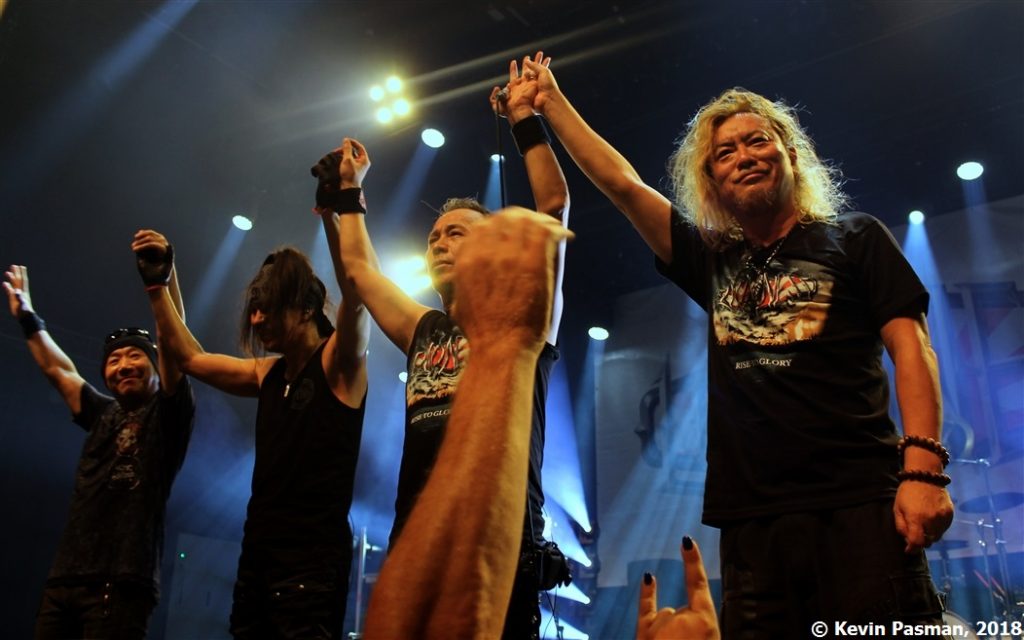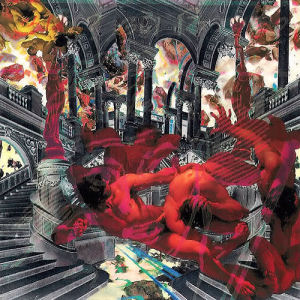
Loudness was one of the first Japanese bands that also had some success in Europe and North America. Partially due to the MTV success of ‘Crazy Night’ and Akira Takasaki’s status as a guitar hero, but according to singer Minoru Niihara, Loudness also was lucky enough to be at the right place at the right time. We spoke with Niihara prior to the concert in Alkmaar, at which Loudness promoted its 27th studio album ‘Rise To Glory’.
After the previous album ‘The Sun Will Rise Again’, we had to wait over three and a half years for ‘Rise To Glory’. And that is quite surprising, as the band has been releasing new albums just about every year since the original lineup of Niihara, Takasaki, bassist Masayoshi Yamashita and drummer Munetaka Higuchi reunited around the turn of the century. Even after Higuchi passed away in 2008, there were hardly any delays in their release schedule. “We needed the extra time“, Niihara confesses. “In addition, we needed to look for a new record label, because our previous contract expired. In the meantime, Akira kept on writing new songs. Because of that, we could select the best material.”
For his lyrics, Niihara employs a rather unconventional approach: “I think of a theme and write down my thoughts about that, just some ideas and lines in Japanese. After that, three friends of mine help me turn it into a complete set of lyrics. They have been raised bilingual in California and live in Japan these days. They speak perfect Japanese and because of that, they know the weaknesses of Japanese people speaking English. You could say they fix it. Many Japanese people need someone to tell them what is wrong with their English. There hardly is any need to speak or write English when you live in Japan. Even at the universities, classes are in Japanese.”
Timing
When Loudness was founded in 1981, there were no heavy metal bands in Japan. “Before us, you only had Bow Wow from Tokyo and Murasaki from Okinawa“, Niihara confirms. “And those bands weren’t really heavy metal, because we didn’t know that back then. They were hardrock bands. I’m from Osaka, where a lot of young British hardrock bands performed. I was in a school band with which we played covers of Deep Purple and Led Zeppelin. But professional hardrock bands? We didn’t have those in the seventies. There were lots of people who listened to western hardrock, but no one played the music themselves. I don’t actually know why either.
We were lucky. Around the time we released our debut album (‘The Birthday Eve’, 1981), the new wave of British heavy metal became really popular in Japan. Bands like Iron Maiden and Saxon were very popular. That made people curious about our music, because we were a Japanese band that also made this type of music. Our timing turned out to be perfect. Young rockers loved us and Akira became a guitar hero. He actually already was when he played with Lazy. That was a pop group, but his playing was amazing. When he was seventeen, he was already known as a great guitar player.”
Sold out
“Before I joined Loudness, I have talked to some people who worked for record labels. When they heard I wanted to play hardrock, all of them said: that’s old, no one will buy that. After we received a gold record for the first Loudness album, the same people suddenly told us that they knew our music would become big. Bullshit! Some of these guys even literally said we would never go anywhere.”
Things went differently. Loudness became a big success in Japan. “Every place we played was sold out“, says Niihara. “And then we’re talking about two to three thousand capacity venues. While we only had one album out. After that, more and more bands that kind of sounded like Loudness popped up. Every record company tried to sign its own Loudness. The positive thing about that is that many Japanese hardrock bands got the chance to release an album. Two or three years after our debut album, Japanese metal was very popular.”
San Francisco
“After a while, the scene slowed down a little. Our sound engineer and friend Daniel McClendon, who is from San Francisco, asked us why we wouldn’t just go to the States for a couple of shows someday. In Japan, we had achieved just about everything we could achieve. In 1983 we went to California for a couple of concerts, just to see what the possibilities were for us. We did four shows in San Francisco and two in Los Angeles.
The audience in San Francisco was insane. There was a very active, hardcore underground heavy metal scene there. We met bands like Metallica and Slayer there when they weren’t much more than local bands. That kind of surprised me, because the image I had of music from San Francisco couldn’t be more different. I thought of relaxed rock music like The Doobie Brothers and the Eagles. Our shows were attended by young guys who were looking for new heavy metal, however. We didn’t even know how all these people knew about us, because we hadn’t released a single album in the States yet.
 Later on, we found out that they traded tapes with each other. Metallica’s drummer Lars Ulrich was one of those fanatic tape traders. He also already knew Bow Wow, for instance. There was even a record store in San Francisco that imported our lp’s. Their owner really helped us simply by playing our music to people who might be interested in us. That way, Loudness could already build an audience before we ever played in the States.”
Later on, we found out that they traded tapes with each other. Metallica’s drummer Lars Ulrich was one of those fanatic tape traders. He also already knew Bow Wow, for instance. There was even a record store in San Francisco that imported our lp’s. Their owner really helped us simply by playing our music to people who might be interested in us. That way, Loudness could already build an audience before we ever played in the States.”
Identity crisis
Thanks to the presence of an A&R manager of the big Atlantic Records label, Loudness became the first Japanese metal band that signed with a major label in America. Initially, that was fruitful: ‘Crazy Nights’ and the accompanying album ‘Thunder In The East’ (1985) became a big success. When it turned out difficult to retain that success, friction developed within the band, which eventually lead to Niihara’s departure. A couple of years later, Yamashita left as well.
In the nineties, Loudness underwent a sizeable identity crisis. With the American singer Mike Vescera, the band recorded two albums that were obviously aimed toward the Californian glam metal scene, only to follow that up with the incredibly heavy ‘Loudness’ (1992) with singer Masaki Yamada (ex-EZO) and Taiji Sawada, who had just left X Japan at the time. After that, Loudness appeared to follow the alternative metal trend, though without Sawada. In the meantime, Niihara was occupied with bands like Ded Chaplin, Sly and X.Y.Z.→A.
Mature
The turning point arrived around the turn of the century, when Loudness’ classic line-up reunited, allegedly on the recommendation of Masaki Yamada. “Akira says that’s what happened“, Niihara says. “I think Akira had the idea to bring the original guys back together again himself as well. Around that time, Masaki told him the time was right for a reunion. Maybe it just had to happen. Our twentieth anniversary was upcoming and Akira wanted to do something special for that occasion.
It was supposed to be a reunion for maybe one or two years, but after our new album (‘Spiritual Canoe’, 2001) and the tour, the fans begged us to continue with the same line-up. We got together to talk about it and nobody actually wanted to quit. Everyone was curious to see where else we could go. And we wanted to play in Europe again, so we just tried it. And we’re still here! We’ve been around longer now than we were together in the eighties.”
Niihara does have an explanation for that. “We are older and wiser“, he laughs. “We sometimes think back to those days and realize we were a bunch of idiots. We drank too much and we were acting really stupid sometimes. These days, we have families and children. We have become a lot more mature.”
The singer did not listen to the albums he did not sing on until after the reunion. “In the nineties, I was too busy with my own music“, he explains. “And besides, I was trying to leave Loudness behind me. They kicked me out, after all. After the reunion, we had to play some songs from the albums recorded with Mike and Masaki. It wasn’t until then that I started listening to the material from those days. And I was really impressed! Mike Vescera sings great on those two records!”

Recovery
During this tour, the drum stool is occupied by Ryuichi ‘Ryu’ Nishida, who worked as a session drummer with the likes of Gackt and Marty Friedman and is a part of the instrumental rock band Ra:IN with X Japan guitarist Pata. Earlier this year, Masayuki ‘Ampan’ Suzuki, who replaced Higuchi after his death, was hit by a stroke. “He is working hard on his recovery“, Niihara reassures. “There are some problems with the right side of his body. He has trouble talking and holding his drum sticks.
We are just happy that he’s still there. There are so many people who die from the same conditions. We hope he can play a couple of songs with us by the end of the year. More than a couple of songs is really too much for him at this point. We told him: please take your time, don’t rush. When he’s ready, we will go for it again. We are fortunate enough to have a fantastic drummer like Nishida helping us out.”
A Dutch version of this interview can be read at The Sushi Times.


 Later on, we found out that they traded tapes with each other. Metallica’s drummer Lars Ulrich was one of those fanatic tape traders. He also already knew Bow Wow, for instance. There was even a record store in San Francisco that imported our lp’s. Their owner really helped us simply by playing our music to people who might be interested in us. That way, Loudness could already build an audience before we ever played in the States.”
Later on, we found out that they traded tapes with each other. Metallica’s drummer Lars Ulrich was one of those fanatic tape traders. He also already knew Bow Wow, for instance. There was even a record store in San Francisco that imported our lp’s. Their owner really helped us simply by playing our music to people who might be interested in us. That way, Loudness could already build an audience before we ever played in the States.”




